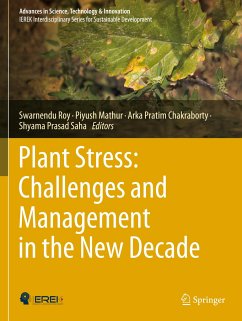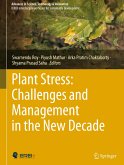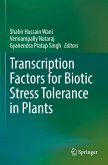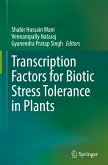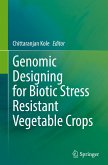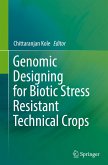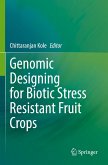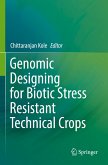Plant Stress: Challenges and Management in the New Decade
Herausgegeben:Roy, Swarnendu; Mathur, Piyush; Chakraborty, Arka Pratim; Saha, Shyama Prasad
Plant Stress: Challenges and Management in the New Decade
Herausgegeben:Roy, Swarnendu; Mathur, Piyush; Chakraborty, Arka Pratim; Saha, Shyama Prasad
- Broschiertes Buch
- Merkliste
- Auf die Merkliste
- Bewerten Bewerten
- Teilen
- Produkt teilen
- Produkterinnerung
- Produkterinnerung
This book presents an inclusive approach to deal with plant stresses in light of recent technological advances. As we have entered into a new decade, researchers and scientists should review and evaluate the recent findings in the field of plant stress management and visualize what we need to focus upon in the near future to increase crop yield. Above all, global climate changes present the greatest challenges of all time for plant scientists. In this context, the book highlights the recent findings and future perspectives in crop improvement to the faculties, scientists, research scholars,…mehr
Andere Kunden interessierten sich auch für
![Plant Stress: Challenges and Management in the New Decade Plant Stress: Challenges and Management in the New Decade]() Plant Stress: Challenges and Management in the New Decade154,99 €
Plant Stress: Challenges and Management in the New Decade154,99 €![Transcription Factors for Biotic Stress Tolerance in Plants Transcription Factors for Biotic Stress Tolerance in Plants]() Transcription Factors for Biotic Stress Tolerance in Plants116,99 €
Transcription Factors for Biotic Stress Tolerance in Plants116,99 €![Transcription Factors for Biotic Stress Tolerance in Plants Transcription Factors for Biotic Stress Tolerance in Plants]() Transcription Factors for Biotic Stress Tolerance in Plants116,99 €
Transcription Factors for Biotic Stress Tolerance in Plants116,99 €![Genomic Designing for Biotic Stress Resistant Vegetable Crops Genomic Designing for Biotic Stress Resistant Vegetable Crops]() Genomic Designing for Biotic Stress Resistant Vegetable Crops267,49 €
Genomic Designing for Biotic Stress Resistant Vegetable Crops267,49 €![Genomic Designing for Biotic Stress Resistant Technical Crops Genomic Designing for Biotic Stress Resistant Technical Crops]() Genomic Designing for Biotic Stress Resistant Technical Crops160,49 €
Genomic Designing for Biotic Stress Resistant Technical Crops160,49 €![Genomic Designing for Biotic Stress Resistant Fruit Crops Genomic Designing for Biotic Stress Resistant Fruit Crops]() Genomic Designing for Biotic Stress Resistant Fruit Crops193,99 €
Genomic Designing for Biotic Stress Resistant Fruit Crops193,99 €![Genomic Designing for Biotic Stress Resistant Technical Crops Genomic Designing for Biotic Stress Resistant Technical Crops]() Genomic Designing for Biotic Stress Resistant Technical Crops116,99 €
Genomic Designing for Biotic Stress Resistant Technical Crops116,99 €-
-
-
This book presents an inclusive approach to deal with plant stresses in light of recent technological advances. As we have entered into a new decade, researchers and scientists should review and evaluate the recent findings in the field of plant stress management and visualize what we need to focus upon in the near future to increase crop yield. Above all, global climate changes present the greatest challenges of all time for plant scientists. In this context, the book highlights the recent findings and future perspectives in crop improvement to the faculties, scientists, research scholars, and postgraduate students. Major features of the book include an inclusive approach in understanding the mechanism of stress tolerance; recent advances and innovations in the field of allied disciplines like microbiology, molecular biology, biotechnology, plant breeding, nanobiotechnology, etc., for improving plant stress tolerance; and illustrative sketches to convey the mechanism and strategies of stress alleviation.
Produktdetails
- Produktdetails
- Advances in Science, Technology & Innovation
- Verlag: Springer / Springer International Publishing / Springer, Berlin
- Artikelnr. des Verlages: 978-3-030-95367-6
- 1st edition 2022
- Seitenzahl: 476
- Erscheinungstermin: 2. April 2023
- Englisch
- Abmessung: 279mm x 210mm x 26mm
- Gewicht: 1150g
- ISBN-13: 9783030953676
- ISBN-10: 303095367X
- Artikelnr.: 67562609
- Herstellerkennzeichnung Die Herstellerinformationen sind derzeit nicht verfügbar.
- Advances in Science, Technology & Innovation
- Verlag: Springer / Springer International Publishing / Springer, Berlin
- Artikelnr. des Verlages: 978-3-030-95367-6
- 1st edition 2022
- Seitenzahl: 476
- Erscheinungstermin: 2. April 2023
- Englisch
- Abmessung: 279mm x 210mm x 26mm
- Gewicht: 1150g
- ISBN-13: 9783030953676
- ISBN-10: 303095367X
- Artikelnr.: 67562609
- Herstellerkennzeichnung Die Herstellerinformationen sind derzeit nicht verfügbar.
Dr. Swarnendu Roy currently works as Assistant Professor in the University of North Bengal, Siliguri, India. He has more than 10 years of teaching experience. He has been Recipient of University Gold Medal for securing 1st position at B.Sc. and University Silver medal for securing 2nd position at M.Sc. level. He received the Post-Graduate Merit Scholarship for University Rank Holder-awarded by Ministry of HRD and UGC (2006- 2008), Government of India. He also received CSIR Junior Research Fellowship-awarded by CSIR-UGC (2008) for Ph.D. degree. He has published more than 20 research articles in reputed journals and book chapters in edited volumes till date. He has submitted cDNA sequences of NHX and SOS1 genes of Cynodon dactylon for the first time to NCBI. Presently, he is actively engaged in research topics encompassing mechanism of salinity and drought stress in cereals and legumes, stress management by functionalized nanoparticles and bioinformatics study ofstress-related transcription factors. He is presently supervising 4 research scholars including 3 UGC-JRFs. He has also guided 14 M.Sc. students in their dissertation work. He has also received International Travel Support (ITS) from DST, Government of India to present his research paper at the International Conference on Integrative Plant Physiology 2019 at Sitges, Spain (27-29 October, 2019). He is Life Member of prestigious societies like 'The Indian Science Congress Association' and Association of Food Scientists and Technologist (India). SCOPUS profile: https://www.scopus.com/authid/detail.uri?authorId=56127914000 Dr. Piyush Mathur currently works as Assistant Professor in the Department of Botany, University of North Bengal, West Bengal, India. His research deals with climate change and biotic stress, microbial diversity and plant disease management. He has done his Ph.D. in Botany with specialization inMycology and Plant Pathology. His Ph.D. research dealt with the effect of elevated carbon dioxide levels on plant pathogen interactions. He has published papers in well-known international journals of good repute. At the same time, he has contributed article in the form of book chapters in International and National books. He has actively participated in both National and International conferences held in India and abroad. He has been awarded the best poster and oral presentations in several conferences. Dr. Mathur received CSIR-Foreign Travel Grant for attending and participating in the 19th Australasian Plant Pathology Conference held at the University of Auckland, Auckland, New Zealand, from 25-29th November, 2013. He also received a Foreign Travel Grant by Research Council, University of Delhi for participating in 14th International Rapeseed Congress held at The Convention Centre, 35-22nd Street East, TCU Place Saskatoon, Saskatchewan Canada in 2015. Recently, Dr. Mathur deliveredan oral presentation in 3rd Agriculture and Climate Change Conference held at Budapest, Hungary, in 2019 with the help of Foreign Travel Grant by International Travel Support Scheme, SERB, DST, GOI. Dr. Mathur is Active Member of Society of Rapeseed Mustard Research (SRMR), Bharatpur, and Delhi University Botanical Society (DUBS), Delhi, India. SCOPUS profile: https://www.scopus.com/authid/detail.uri?authorId=57085961800 Dr. Arka Pratim Chakraborty currently works as Assistant Professor in the Department of Botany, Raiganj University, Raiganj. He has been Recipient of University Gold Medal for securing 1st position at M.Sc. level from the University of North Bengal. He has about 9 years of research experience in various research projects (funded by DBT, CSIR & NBAIM-ICAR) and has 26 peer-reviewed international and national publications, 3 articles as book chapters and one book for Botany B.Sc.undergraduate students till date. He has also delivered numerous oral and poster presentations in numerous International and National symposia/conferences. He is interested in the field of research related to plant-microbe interactions, host-pathogen interactions and plant disease management through plant growth promoting rhizobacteria, biotic and abiotic stresses. Dr. Chakraborty was awarded K.P.S. Bilgrami best poster paper award in 2007, P.P. Singhal Pesticides India Competition award in 2010, PR Verma award competition for Ph.D. students in the year 2015 and K.P.S. Bilgrami best poster paper presentation award in 2015. Dr. Chakraborty is actively associated with scientific societies as Life Member of Asian PGPR Society, Association of Microbiologists of India (AMI), Indian Mycological Society (IMS) and Indian society of Mycology and Plant Pathology (ISMPP). SCOPUS profile: https://www.scopus.com/authid/detail.uri?authorId=8898810100 Dr. Shyama Prasad Saha has been working as Assistant Professor in the Department of Microbiology, University of North Bengal, India, for 10 years. He has obtained his M.Sc. degree from the University of North Bengal with gold medal for securing 1st class 1st position. He has received his Ph.D. from the Department of Biotechnology, University of North Bengal. He has extensive research experience of approximately 12 years in the field of classical microbiology, industrial microbiology, agricultural microbiology and microbial biotechnology with deep interest in the field of microbes derived carbohydrate active enzymes, value added product, plant growth promoting rhizobacteria, bacteriophages, probiotics, etc. He has published several book chapters as well as articles in international journals. SCOPUS profile: https://www.scopus.com/authid/detail.uri?authorId=56116113200
Part I Understanding and management of abiotic and biotic stress in plants.- 1. Plant responses under abiotic stress and mitigation options towards agricultural sustainability.- 2. Plant viruses: Factors involved in emergence and recent advances in their management.- 3. Crop plants under metal stress and its remediation.- 4. Exploiting host resistance in management of vascular wilt in major pulses of India.- 5. Atmospheric nitric oxide (NO) regulates ozone (O3)-induced stress in plants: Ally or Foe?.- 6. Brassinosteroids: A wonder growth regulator to alleviate abiotic stresses in plants.- 7. Structural and functional role of plant dehydrins in enhancing stress tolerance.- 8. Adaptation of microalgae to temperature and light stress.- 9. Halopriming: Sustainable approach for abiotic stress management in crops.- 10. Naturally growing native plants of wastelands: Their stress management strategies and prospects in changing climate.- 11. Vulnerability and resilience of sorghum to changing climatic conditions: Lessons from the past and hope for the future.- 12. Recent updates in plant disease management.- 13. Heat stress in wheat: Impact and management strategies towards climate resilience.- Part II Potential of microbes in plant stress management.- 14. Plant-microbe interactions in combating abiotic stresses.- 15. Cadmium stress management in plants: Prospects of plant growth promoting rhizobacteria.- 16. Harnessing the power of microbes to overcome heavy metal stress in crop plant.- 17. Halotolerant plant growth promoting rhizobacteria: A futuristic direction to salt stress tolerance.- 18. Outside the cell surface: Encoding the role of Exopolysaccharide producing rhizobacteria to boost the drought tolerance in plants.- 19. Potential of plant growth promoting rhizobacteria for enhancement of plant growth and its role in improving soil health under abiotic stress.- 20. Soil application of plant growth promoting fungi for sustainable agriculture in the new decade.- 21. Deep insights into the role of endophytic fungi in abiotic stress tolerance in plants.- 22. Post-green revolution degradation of agricultural land in India: Role of mycorrhizae in the sustainability of agriculture and ecosystems.- Part III Strategies and technological advances for crop improvement.- 23. Integrated OMICS approaches to ameliorate the abiotic stress in Brassica napus.- 24. Proteomics - A powerful tool for understanding saline stress response in germinating seed.- 25. Role of secondary metabolites and prospects of engineering secondary metabolite production for crop improvement.- 26. Interventions of nanotechnology for the growth and stress tolerance in crop plants.- 27. Remote Sensing Technology: A new dimension in the detection, quantification andtracking of abiotic and biotic stresses.
Part I Understanding and management of abiotic and biotic stress in plants.- 1. Plant responses under abiotic stress and mitigation options towards agricultural sustainability.- 2. Plant viruses: Factors involved in emergence and recent advances in their management.- 3. Crop plants under metal stress and its remediation.- 4. Exploiting host resistance in management of vascular wilt in major pulses of India.- 5. Atmospheric nitric oxide (NO) regulates ozone (O3)-induced stress in plants: Ally or Foe?.- 6. Brassinosteroids: A wonder growth regulator to alleviate abiotic stresses in plants.- 7. Structural and functional role of plant dehydrins in enhancing stress tolerance.- 8. Adaptation of microalgae to temperature and light stress.- 9. Halopriming: Sustainable approach for abiotic stress management in crops.- 10. Naturally growing native plants of wastelands: Their stress management strategies and prospects in changing climate.- 11. Vulnerability and resilience of sorghum to changing climatic conditions: Lessons from the past and hope for the future.- 12. Recent updates in plant disease management.- 13. Heat stress in wheat: Impact and management strategies towards climate resilience.- Part II Potential of microbes in plant stress management.- 14. Plant-microbe interactions in combating abiotic stresses.- 15. Cadmium stress management in plants: Prospects of plant growth promoting rhizobacteria.- 16. Harnessing the power of microbes to overcome heavy metal stress in crop plant.- 17. Halotolerant plant growth promoting rhizobacteria: A futuristic direction to salt stress tolerance.- 18. Outside the cell surface: Encoding the role of Exopolysaccharide producing rhizobacteria to boost the drought tolerance in plants.- 19. Potential of plant growth promoting rhizobacteria for enhancement of plant growth and its role in improving soil health under abiotic stress.- 20. Soil application of plant growth promoting fungi for sustainable agriculture in the new decade.- 21. Deep insights into the role of endophytic fungi in abiotic stress tolerance in plants.- 22. Post-green revolution degradation of agricultural land in India: Role of mycorrhizae in the sustainability of agriculture and ecosystems.- Part III Strategies and technological advances for crop improvement.- 23. Integrated OMICS approaches to ameliorate the abiotic stress in Brassica napus.- 24. Proteomics - A powerful tool for understanding saline stress response in germinating seed.- 25. Role of secondary metabolites and prospects of engineering secondary metabolite production for crop improvement.- 26. Interventions of nanotechnology for the growth and stress tolerance in crop plants.- 27. Remote Sensing Technology: A new dimension in the detection, quantification andtracking of abiotic and biotic stresses.

